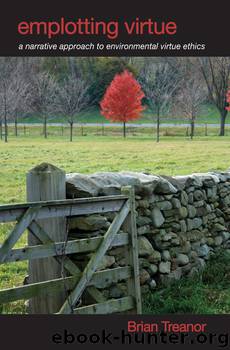Emplotting Virtue by Treanor Brian

Author:Treanor, Brian
Language: eng
Format: epub
Publisher: State University of New York Press
Published: 2014-03-14T16:00:00+00:00
Poetic Justice
The fourth ethical power of the literary form that Nussbaum finds aligned with the Aristotelian ethical view, the ethical relevance of emotions, is addressed in depth in Poetic Justice.84 There she addresses the role of emotion in rational judgment, specifically in cases of legal judgment but more broadly as relevant for any good citizen. Novels in particular, says Nussbaum, contribute to our ethical education and ethical judgment.
There is a widely held assumption that fiction, storytelling, imagination, and similar phenomena are at odds with rationality. This prejudice is not always, or perhaps even often, conscious, vocal, or militant; however, people don’t need to argue that “imagination is irrational” in order to act as if this is the case. Each time we are asked to view an ethical case “objectively” or “dispassionately” the implication is that emotional connection with the people in question, imaginatively considering what it would be like to be in their shoes, to play their part in their narrative, is antithetical to rational assessment of the case. However, Nussbaum argues that storytelling and the use of literary imagination are not opposed to rational argument; rather they are, at least in some cases, an essential part of it. How so?
“Fancy” is Nussbaum’s term for “the ability to see one thing as another,” which Ricoeur addresses under the rubric metaphor.85 And, critically, the perspective associated in any “seeing as” is always implicitly normative. “See the world this way.” “Change your life!” These exhortations go hand-in-hand. Ethically, this is connected to the ability to see oneself in the shoes of another, and therefore, says Nussbaum, with important virtues like charity, generosity, and justice. The use of narrative, or literary, imagination encourages us to concern ourselves with the lives of people who may be very different from us, including their ethical choices, their characteristic view of the world, and their conception of human goods. As Ricoeur and Kearney suggest, we enter imaginatively into the lives of these people and experience things “as if” we were there. Nussbaum argues that novels allow us to “imagine what it is like to live the life of another person who might, given a change in circumstance, be oneself or one of one’s loved ones.”86
One of Nussbaum’s key contributions, for the present project, is her assessment of “judicious spectatorship” in the context of novels, narrative, fancy, and imagination. Building on the work of Adam Smith in The Theory of Moral Sentiments, Nussbaum sketches an image of a judge whose characteristics form the paradigm for public rationality.87 The judicious spectator is, precisely, a spectator: “he is not personally involved in the events he witnesses, although he cares about the participants as a concerned friend.”88 That is to say—with Aristotle, Kearney, and Ricoeur—the narrative “reader” must have sufficient distance from the events she is “witnessing”; however, despite this distance or spectatorship, among the most important ethical faculties of the judicious spectator is “the power of imagining vividly what it is like to be each of the persons whose situation he imagines.
Download
This site does not store any files on its server. We only index and link to content provided by other sites. Please contact the content providers to delete copyright contents if any and email us, we'll remove relevant links or contents immediately.
The remains of the day by Kazuo Ishiguro(8961)
Tools of Titans by Timothy Ferriss(8357)
Giovanni's Room by James Baldwin(7313)
The Black Swan by Nassim Nicholas Taleb(7097)
Inner Engineering: A Yogi's Guide to Joy by Sadhguru(6780)
The Way of Zen by Alan W. Watts(6589)
Asking the Right Questions: A Guide to Critical Thinking by M. Neil Browne & Stuart M. Keeley(5747)
The Power of Now: A Guide to Spiritual Enlightenment by Eckhart Tolle(5740)
The Six Wives Of Henry VIII (WOMEN IN HISTORY) by Fraser Antonia(5493)
Astrophysics for People in a Hurry by Neil DeGrasse Tyson(5172)
Housekeeping by Marilynne Robinson(4430)
12 Rules for Life by Jordan B. Peterson(4298)
Double Down (Diary of a Wimpy Kid Book 11) by Jeff Kinney(4257)
The Ethical Slut by Janet W. Hardy(4235)
Skin in the Game by Nassim Nicholas Taleb(4231)
Ikigai by Héctor García & Francesc Miralles(4228)
The Art of Happiness by The Dalai Lama(4118)
Skin in the Game: Hidden Asymmetries in Daily Life by Nassim Nicholas Taleb(3985)
Walking by Henry David Thoreau(3948)
